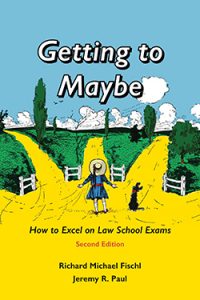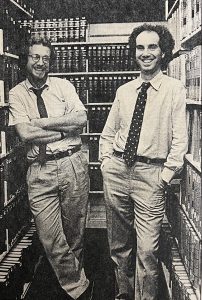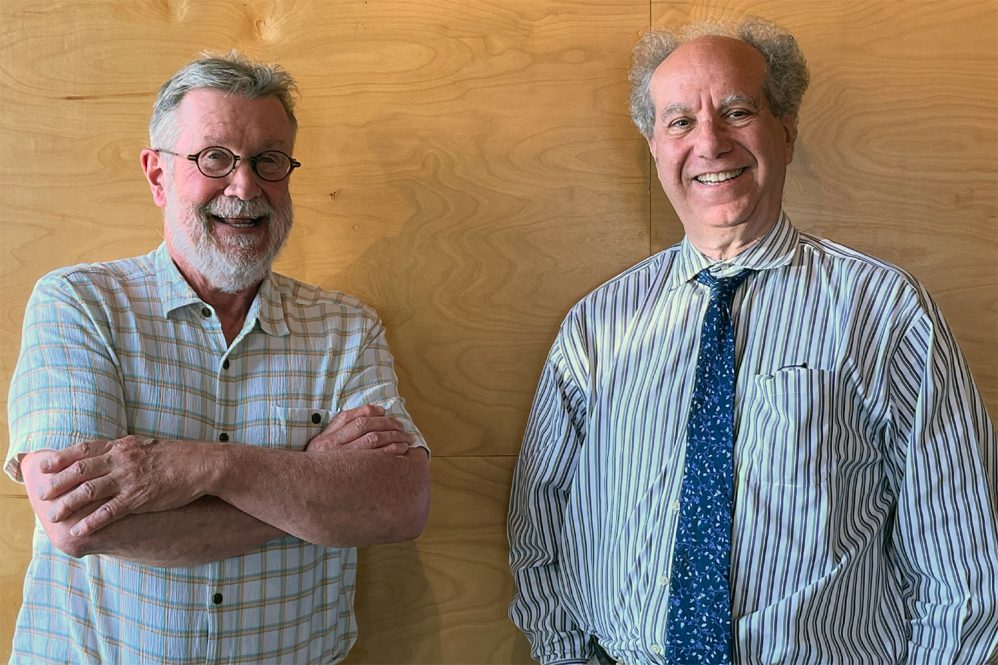“Getting to Maybe: How to Excel on Law School Exams” has been the best-selling book on the topic for nearly 25 years. Law students recommend it to each other, law schools include it on summer reading lists and law professors teach it in class.
 The authors, UConn Law Professor Richard Michael Fischl and Northeastern University School of Law Professor Jeremy R. Paul, developed popular presentations and workshops drawn from the book and their experiences. Over time, they have adjusted their approach to encompass changes in technology, study aids and exam structure. This generated new ideas for the book, which Carolina Academic Press released this month in an updated and expanded second edition.
The authors, UConn Law Professor Richard Michael Fischl and Northeastern University School of Law Professor Jeremy R. Paul, developed popular presentations and workshops drawn from the book and their experiences. Over time, they have adjusted their approach to encompass changes in technology, study aids and exam structure. This generated new ideas for the book, which Carolina Academic Press released this month in an updated and expanded second edition.
The new edition has a great deal of fresh material, but the basic premise is unchanged. As Paul explained, “The single key insight is that doing well on exams is a skill. What is the skill? The skill has a lot to do with legal reasoning and legal reasoning isn’t so simple.”
While they originally envisioned the book as a resource for first-year law students disappointed with their initial grades, Fischl and Paul found that most of their readers took up the book before their first semester of law school even began. This led to a new four-chapter section that focuses on study strategies, warns against over-reliance on commercial study aids, and advises disconnecting from digital distractions while studying and in the classroom.
The second edition also includes a new exercise, developed in the authors’ workshops, that presents a classic exam question and walks readers through answers that get progressively better. And the book has a new chapter on multiple choice exams, which the authors felt the need to address – if not endorse – as an increasingly common form of law school testing.
There was additional motivation to renew their efforts. “Something really big happened between the first edition and the second edition, which is that Jeremy’s sons and my daughter all went to law school,” Fischl said. “In her first year of law school, which was 2018 to ‘19, I couldn’t look at a student in my class without seeing Molly’s face.”
The authors’ intellectual understanding of and sympathy for law students’ struggles suddenly became personal. The effect, Fischl said, was a gentler approach to detaching readers from rote learning in favor of the “maybes” inherent in legal reasoning. “It made us work even harder than we had in the first edition on understanding why they wanted certainty and how we could persuade them to let go of that longing for certainty in the world of ambiguity,” he said.
UConn Law Professor Travis Pantin remembers the book from his law student days and now recommends it to his own students.
“When I was a student at Yale Law School, one of the most prominent professors there told my entire 1L class that we absolutely needed to buy and read ‘Getting to Maybe,’ ” Pantin said. “It’s the missing guidebook to law school exams. There’s truly nothing else that comes close to providing guidance about what to expect when one heads into the law school exam room. It’s brilliant. I’ve never had a single student tell me that they found it anything other than immensely helpful.”

The origins of the first edition of the book go back to the early 1980s, when Fischl and Paul were young, untenured professors at the University of Miami School of Law. Both had been influenced, separately, by Professor Duncan Kennedy at Harvard Law School, who introduced them to critical legal studies and some of the ideas and techniques that they later brought to the book. Miami’s Dean, the late Soia Mentschikoff, and her co-author, Miami Professor Irwin Stotzky, also provided key inspiration on the topic of case briefing. Seen as friendly to students at Miami Law, Fischl and Paul were invited by the Black Law Students Association to join a panel discussion about exam preparation.
The discussion left Paul intrigued by the idea of a book, so he asked the library to search for volumes on the topic. “They wheeled in carts full of books, at least 100 books on how to succeed in law school,” he said. “None of them, not one of them, was about exams.”
Paul developed a handout about legal reasoning for his Property class, which he turned into a 1988 article for the Virginia Law Review titled “A Bedtime Story.” It introduced the fundamentals of legal reasoning, or thinking like a lawyer, in a hypothetical argument between a babysitter and a child who wants to stay up late.
“Many of our colleagues in Miami loved it, but then I also had a colleague who told me, ‘Don’t you dream of publishing this, because you’ll look back on it 25 years from now and be embarrassed that you wrote something so manifestly about teaching,’” Paul said. “And so, of course, I ignored him.”
Fischl was on board with the book idea. He had developed a strong interest in teaching law students how to approach exams, much of it derived from students whose efforts were not producing the grades they expected. “Students would come to see me in January of the first year, practically in tears over having worked really hard and studied really hard,” he said. If there were a book to help them, perhaps it would sell a few copies through word of mouth, he thought.
Sales were much better than that, and the book became a source of pride and speaking invitations. In the interim between the two editions, first Paul and then Fischl joined the faculty of the UConn School of Law. Paul became dean from 2007 to 2012 and moved on to serve as dean at the Northeastern University School of Law. In 2018 he stepped down to teach at Northeastern, where he remains on the faculty.
As the second edition rolls out, it has been greeted as enthusiastically as the first. Erwin Chemerinsky, dean of the University of California, Berkeley School of Law, called it “the best book I have ever seen on how law students should approach exams,” adding that “Every law student will benefit from reading this book.”



